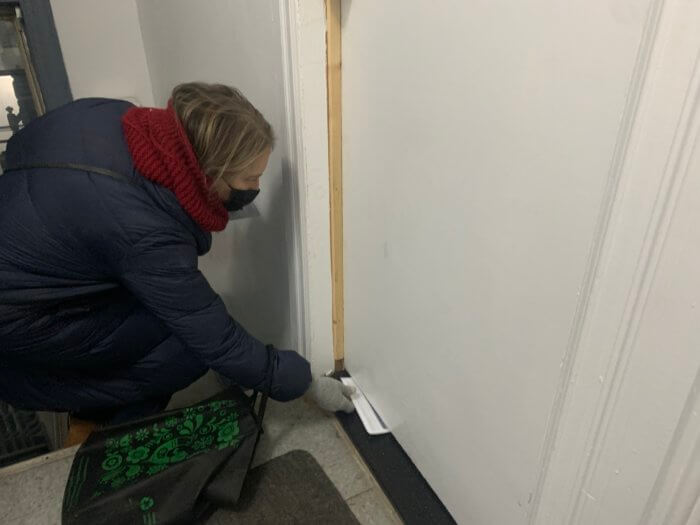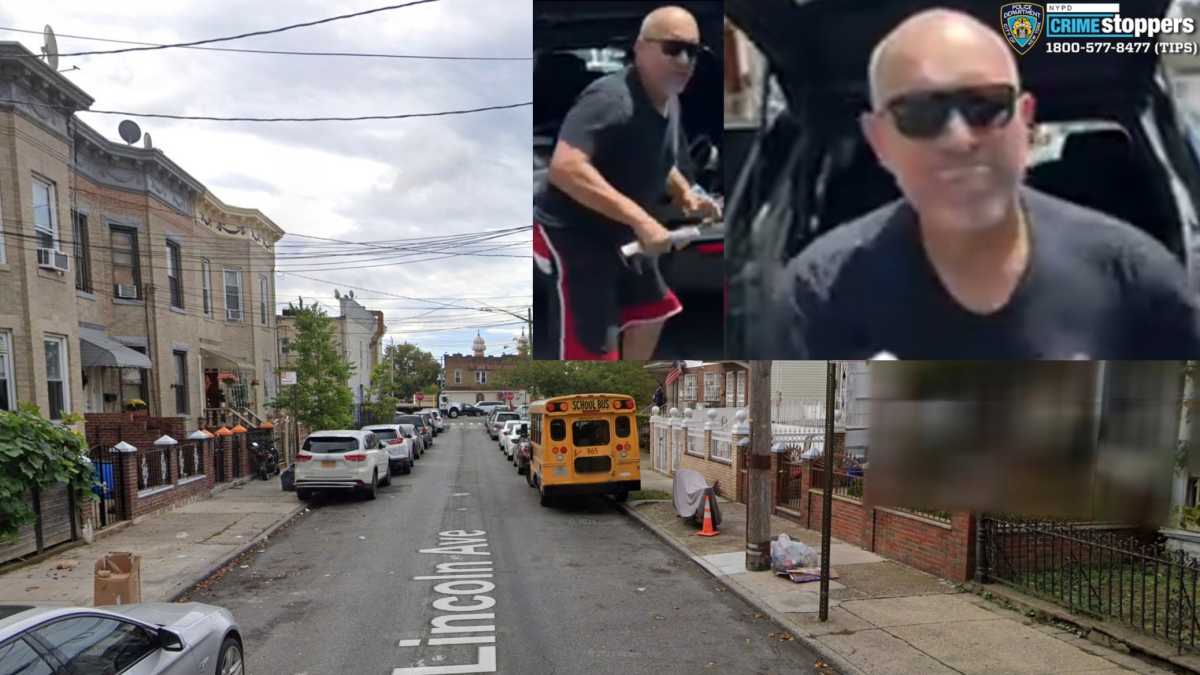Members of the Greenbrook Tenants Coalition and Councilmember Lincoln Restler went canvassing at a number of apartment buildings in Greenpoint and Williamsburg last week to warn tenants of the predatory practices of their new landlord.
Private-equity backed real estate firm Greenbrook Partners recently snapped up a number of buildings in North Brooklyn, alarming their current tenants and elected officials, who say the company is likely to kick out existing residents and hike up the rent.
“Their business model is sickening,” Restler said. “They understand that rent-stabilized tenants have some protections, but that tenants living in units that are not rent-stabilized can be evicted with 30 days notice.”
Last summer, Greenbrook sent dozens of non-renewal notices to tenants in a number of central Brooklyn apartment buildings they purchased. Some residents packed up and moved out, lacking the bandwidth or the ability to engage in a legal battle, but a number have stayed behind, unwilling to leave without a fight.
Months later, the company started purchasing a slew of buildings further north. Last week, Restler, the Tenants Coalition, and local volunteers went door-to-door at 16 of those buildings, passing out information about Greenbrook and inviting them to an information session with Restler and housing lawyers from local group Communities Resist.

“Last night, I visited a 28-unit apartment building in Brooklyn Heights, on Pineapple Street, and it was eerie, because 25 of the units were empty,” Restler said. “Only three rent-stabilized tenants were living there, I think they had all been there for about 50 years.”
Greenbrook Partners did not respond to a request for comment.
The building on Pineapple Street isn’t the only recent Greenbrook acquisition standing nearly-empty. Volunteer Katie Naplatarski and Greenbrook Tenants Coalition member Phil Miller found a number of empty apartments as they canvassed last Thursday night.
Naplatarski slipped fliers under the unanswered doors in a five-unit building purchased by Greenbrook by way of a limited liability company last fall. But only one apartment is occupied, according to its current tenant, Maciej Kapusta, who lives there with his father.
“I spoke with [the new owner,] like, end of October, last year, and he said ‘You must get out, because I’m doing a completely beat demo,” Kapusta said. “I said, listen, you say kick me out, I say, hold on, because someone has more power than you do.”
He effectively ignored the order, telling the new owners he and his father would move out if they could find him an acceptable, affordable ground-floor apartment to replace the one his dad has lived in for 23 years. That apartment never materialized, and, so far, they’ve been left alone. The rest of the building, though, is empty.
“I understand everything’s price goes up,” Kapusta said. “The owner before, he one time brought me a new lease, over $1,000 more. I made a deal, and he gave me only $300 more.”
During the pandemic, when he was out of work, Kapusta said he worked out deals with the old landlord — paying what he could, making up the difference by doing some work around the building.
The new corporate landlord takes away that option, Naplatarski explained, but the Tenants Coalition and Restler are hoping to back him up if any issues do arise.
Kelly and Melanie Feehan moved into a recently-renovated three-unit building in Greenpoint last May — everyone who lives there moved in less than a year ago, Melanie said, and they’ve received notice that the building was changing hands twice already. Records show that Greenbrook purchased it in January.
A letter tacked up in the building’s lobby, dated Dec. 31, 2021, introduced Greenbrook’s management company, McNam Management, as the building’s new owner, and instructed tenants to enroll in a new online payment system.
“Their business model is just to make as much money as they can,” Miller explained. “So, if they can charge more money for this apartment by getting rid of you, they will.”
Kelly first saw the listing for the apartment they ended up renting months before they moved in, and was surprised to see it still available when the sisters went from casually browsing for a new home to actively searching.
“I suspect that’s probably what they did before we moved in,” Melanie said. “We’re definitely overpaying, but we were in kind of a desperate spot when we were looking. I’m curious to see what they do when our lease comes up.”
Some of Miller’s neighbors are part of the long, slow court battle against Greenbrook, but he estimated that around 10 units have been rented at higher price points to new tenants in the last few months
According to StreetEasy, a three-bedroom apartment at 70 Prospect Park West, one of the first buildings Greenbrook purchased last spring, rented for more than $7,800 per month shortly after the sale was finalized. Four years earlier, the same unit was just $4,500 per month. A two-bedroom in the same building was listed for $3,500 per month last February — and $4,600 two months later.

“If you’re going to pay $5,000 a month, you should have a doorman, you should have a gym, you should have storage space, you should have a parking space,” Miller said. “It’s a great location, but it’s not a luxury building.”
Last week, he got a letter from the management company alerting tenants that new management would be taking over on March 10. He wasn’t sure whether Greenbrook had sold the property, or had simply branched off to form a new company with a different name in response to the ongoing litigation.
Restler’s office is hosting an information session on Tuesday evening with the Tenants Coalition and lawyers from Communities Resist, who will share information about Greenbrook and the resources tenants have available if they’re served with a notice of non-renewal.
“The most important thing we need to do is to fight for Good Cause Eviction in Albany, which would actually enshrine real protection into law to ensure that landlords couldn’t just evict people without cause,” Restler said. “And it would place limitations on the amount rent can be increased year-over-year.”
What is Good Cause?
Good Cause Eviction was first introduced by state Sen. Julia Salazar in 2019, but more and more lawmakers, activists, and New Yorkers have been pushing for its passage since the state eviction moratorium ended in January. The bill would prevent landlords from evicting or refusing to renew the leases of tenants in market-rate apartments, so long as those tenants have been paying their rent on time and are otherwise in compliance with the terms of their lease, and effectively prevents landlords from raising rents more than three percent per year.
“Landlords across our state are displacing tenants in order to gain higher profits,” reads the text of the bill. “The de facto evictions happen via non-renewal of their leases. These non-renewals are displacing individuals and families in order for owners to rent out their units to higher income tenants.”
Until Good Cause is passed, Restler and his staff are trying to make use of “every tool at our disposal,” reaching out to the city’s Department of Housing Preservation and Development and the Department of Finance to see how they can help, and they’re planning to put public pressure on the companies investing in Greenbrook.

























